 In the 1970s, Hal Ashby directed your favorite films; Harold & Maude, The Last Detail, Shampoo, and Being There to name a few. In the 1980s, his name topped an unbroken string of dogs. You haven’t heard of these films. You haven’t seen these films. You probably never will. Before we reached the 1990s, Ashby was dead of pancreatic cancer.
In the 1970s, Hal Ashby directed your favorite films; Harold & Maude, The Last Detail, Shampoo, and Being There to name a few. In the 1980s, his name topped an unbroken string of dogs. You haven’t heard of these films. You haven’t seen these films. You probably never will. Before we reached the 1990s, Ashby was dead of pancreatic cancer.
So what happened?
By all accounts, Ashby was an emotionally driven free spirit. He thrived on improvisation. He used a light touch with actors, giving them the freedom to excel. He was also a conceptual genius in editing, which he oversaw himself. (Ashby started as an editor, winning an Oscar for his work for director and mentor Norman Jewison on In the Heat of the Night.) Ashby was also a committed stoner who hated producers and authority.
The common wisdom claims that drug abuse doomed Hal Ashby. Nick Dawson’s biography, “Being Hal Ashby” refutes that claim, however. According to Dawson’s narrative and the numerous sources he quotes, the man wasn’t an addict. It was his conflicts with producers that got him removed from films; it was health issues that had him directing Let’s Spend the Night Together from a cot with an IV in his arm; it was slander that spread rumors of drug dependency and unreliability.
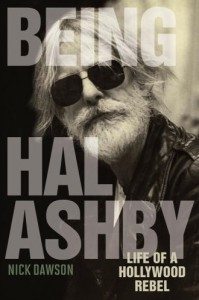 I have a hard time believing this. I’ve seen his 1980s films. They are, for the most part, not good. Worst of them all is The Slugger’s Wife.* It is without saving grace. It is without excuse.
I have a hard time believing this. I’ve seen his 1980s films. They are, for the most part, not good. Worst of them all is The Slugger’s Wife.* It is without saving grace. It is without excuse.
Ashby perhaps was drawn to the project, done in the wake of his losing battle with Lorimar over Lookin’ to Get Out, because of its Neil Simon script. Simon had written some of the most popular comedies of the day (The Odd Couple, The Goodbye Girl, etc.) but had lately been off his game (Max Dugan Returns, I Ought to Be in Pictures). Simon was also known to be controlling of his scripts. His words were sacrosanct and the project’s officious producer, Ray Stark, came as a package deal with Simon.
So why, one might wonder, would a director known for improvisation and anti-authoritarianism sign on to direct a rotten script under the oversight of an unfriendly producer? Dawson posits that it was a combination of poor decision-making and sunny outlook. Concurrently, he describes Ashby as staying out until 3 AM in clubs during production and needing to be escorted home.
Hmm.
Being Hal Ashby is an interesting read. I recommend it for those interested in the director. It fails to press on hard questions, though. It is thick with laudatory descriptions as it glosses over criticism, blaming Ashby’s failings on his father’s suicide and his inability to address that early trauma. It describes the director as frequently stoned and depicts dangerously erratic behavior, but draws no connection between the two. While Ashby’s friends are allowed to praise the man at length, his detractors find little space in the book.
While it’s certainly possible that drug abuse wasn’t to blame for Ashby’s deterioration, it’s also possible that no one Dawson interviewed cared to disparage a man who had nothing left but reputation. Why speak ill of the dead?
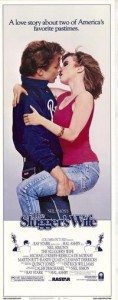 So, according to Dawson, The Slugger’s Wife was just bad luck. As was the ruin of Second Hand Hearts (blamed on a miserable rapport between the leads and unreasonable pressure from producers), the disintegration of Lookin’ to Get Out (blamed on Lorimar backhandedness, novice editors, and Ashby being denied final cut), and the train wreck of 8 Million Ways to Die (script battles, budget battles, Ashby being fired before editing began).
So, according to Dawson, The Slugger’s Wife was just bad luck. As was the ruin of Second Hand Hearts (blamed on a miserable rapport between the leads and unreasonable pressure from producers), the disintegration of Lookin’ to Get Out (blamed on Lorimar backhandedness, novice editors, and Ashby being denied final cut), and the train wreck of 8 Million Ways to Die (script battles, budget battles, Ashby being fired before editing began).
None of it was Ashby’s fault. God forbid we be critical of our heroes.
What we do know is this: The Slugger’s Wife is a film directed by Hal Ashby. It is a film originally edited by Hal Ashby, although editor (and executive producer) Margaret Booth reworked his edit to some unknown degree—perhaps extensively. And it is a terrible, terrible film.
Because you should not watch it, here is what happens:
Atlanta Braves outfielder Darryl Palmer (Michael O’Keefe) goes clubbing with his two teammates, Moose (Randy Quaid, working with Ashby again after The Last Detail) and Manny (Cleavant Derricks). Darryl makes out with his girl and Moose’s girl and isn’t that cute. Moose mentions that the singer—who is singing the worst song of all time in the ugliest dress the 80s could imagine—is pretty.
That’s enough for Darryl. Even though the musician, Debby Huston (Rebecca De Mornay), couldn’t sing satisfactorily if the CIA had her under a blowtorch in Abu Ghraib, he immediately attempts to ply her with his charms. He strikes out and then, gosh, he starts striking out on the ball field as well.
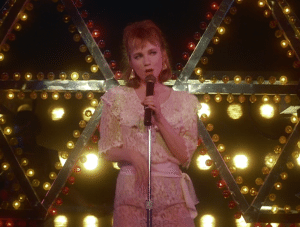
Pretend, for a moment, that this microphone stand is a penis and that you find lace doilies attractive.
I wonder if there’s some sort of connection there?
Darryl stalks Debby, because he loves her for some reason. I guess Moose said she was pretty? Debby is trying to make it as a pop star and good luck, sister. Darryl charmingly causes Debby to wreck her car and then, ha ha, wrecks someone else’s car, too. Don’t worry. He’ll pay for everything.
When vehicular damage isn’t enough to win Debby’s heart, Darryl goes to the club and publicly bets her that he’ll hit two home runs in tomorrow’s game. If he does, she has to have dinner with him. If he doesn’t, he’ll give some money to charity.
In a twist of fate that you couldn’t possibly see coming, Darryl hits two home runs. They go out for dinner in what is possibly the least funny scene I have witnessed since I watched Requiem for a Dream. O’Keefe and De Mornay struggle with Neil Simon’s desperately awful dialogue and characterizations, but there’s plenty of blame to go around. Neither actor is any good. O’Keefe is unlikable, unbelievable, and consistently so. De Mornay is worse. She flails between acting the innocent naif and masturbating her microphone stand to Prince’s Little Red Corvette. She cannot sing. She looks as natural on stage as jellied meat. Every costume that designer Ann Roth puts her in looks like it has been ripped from the back of a bat mitzvah girl in Minneapolis.
De Mornay, who inspired fervid dreams in Risky Business, here exhibits all the sex appeal of burning tires. To Darryl Palmer, though, she’s a muse. He demonstrates his love for her by hitting more home runs and then reenacting Gene Kelly’s Singin’ in the Rain dance as Moose and Manny hose him down. This scene at least proves that there exists someone who sings and dances worse than De Mornay.
Debby goes out with Darryl again, this time for free wieners. We see her perform a few more times, so we understand that time is passing and that Ashby, who used to excel at choosing songs for his films, has totally lost the plot. Could anyone think Neil Young’s “Hey Hey, My My (Into the Black)” would be a good tune to boost a romantic comedy? Is it sexy? Is it a good fit for a female pop star? Is it, possibly, the worst choice this side of “Inna Gadda Da Vida”? Yes. Yes it is.
Anyway, they finally kiss. Then they’re in bed and Darryl is explaining baseball to Debby via the handy medium of cunnilingus. That is precisely as awkward and unarousing as you’re picturing. Almost as unarousing as Darryl putting Debby’s perfume on his bat. Happily, that is not a euphemism.
At this point in the film, one is likely questioning why it is that Neil Simon was not accused of having a drug problem. We’ve got two unlikable characters who don’t seem to actually like each other yet somehow falling in love? Looking past the fact that every single line reading is wrong and that all of the dialogue is painfully unnatural anyway, you’ve got to ask: what the hell is this film about?
Is this a film about sports? Is this a film about love? Is this a comedy? Why would anyone write this picture, let alone decide to film it?
If Hal Ashby wasn’t messed up on drugs, what in god’s name was he thinking?
Naturally, this is the point in the film when Darryl and Debby get married. They’ve had two dates and baseball-infused sexual contact, so why not? Darryl’s baseball prowess is tied to Debby’s affection; as long as she loves him, he’s hitting home runs. So much so that he’s now challenging Roger Maris’ (then standing) single-season home run record.
Alas, this success comes at a price.
Darryl smothers Debby. He needs her there all the time. He doesn’t want her pursuing her pop music career (and neither do I). De Mornay pulls off exactly one decent scene in the film, on a plane, when she confesses her problem to Darryl’s coach Burly (actually well-played by director Martin Ritt, who was supposed to helm the film until health problems intervened).
It seems no one is able to talk sense to Darryl, so the only option is for Debby to start playing gigs again without telling him. They fight. Debby heads off on a tour with her band (mostly Louden Wainwright). As Darryl comes to bat chasing Maris’ record, Debby sneaks out of the stadium. Darryl strikes out and doesn’t even realize it. Can something so literal also be symbolic? Whatever.
If you haven’t noticed it yet, this is the point in the film where it’s hard to miss that every single scene of every single baseball game was shot with the same paltry crowd of extras. There aren’t even enough people to fill out one section of the lower deck. All shots of batters have the same section in the background. Home runs aren’t shown, because there aren’t enough people to pan over the stadium. Even though the Braves are in contention for the pennant, and Maris’ record could be broken at any time, ticket sales are in the toilet.
For this, we’ll blame producer Ray Stark, who failed to pay for enough background.
Darryl puts on “I’m a wreck” make-up and goes to the stadium at night for drunken batting practice. He can’t hit a thing with his bat but the ball machine even with the help of his trusty dog.
It isn’t at all clear if Debby has left him, or if Debby just needed to pursue her career for a bit, but Darryl stalks her to Kansas City where he punches Louden Wainwright and tears up a restaurant and gets arrested. Coach Burly bails him out and tells Moose to get him laid.
Will Darryl be laid, though? No. No he will not. Luckily, he gets beaned in practice and is knocked out. While he’s in the hospital with blurred vision, Burly tricks another singer into pretending to be Debby and visiting him. It’s a clever ploy that would be impossible to see through if you were encased in lead and written by Neil Simon, so Darryl falls for it. He thinks Debby is coming back to him so he starts hitting home runs again.
Then the film ends.
Darryl figures out the trick Burly played on him right before the pennant game. How? By seeing the other singer perform and shaking her hand. Debby comes home anyway, though. I’ve got little idea why. Darryl tells her not to say anything because he wants to play this last game for himself, and not for her. This, I suppose, is character development.
At the big game, Darryl breaks Maris’ record. It’s a close game, of course, and it all comes down to Moose, in probably his last innings in professional ball. Moose knocks one hard and it’s caught just inches this side of the fence. Game over. The Braves lose.
Martin Ritt gets another good bit of acting in, embarrassing really as he’s the only non-actor in the picture. Randy Quaid makes a good Randy Quaid face. Then Darryl and Debby talk and agree to leave the door open. She tries to return his record-breaking home run ball to him, but he tells her to keep it. Maybe she can bring his balls home sometime? Ha ha! Good one, Neil!
Then, seriously, he has a moment frolicking with his golden retriever to end the movie.
So. You tell me. Did Hal Ashby have a drug problem? Was this just a confluence of bad luck and antagonism? Yeah, there may have been some extenuating circumstances during production and during editing, but that’s par for the course in filmmaking. In the end, you can only pass the buck so far.
I love Hal Ashby. I’ve found something to appreciate in all of his films—except this one. I can’t say whether drugs caused this extended slump or if it was something else. Whatever it was, though, it was Hal Ashby.
* I’ve yet to see Second Hard Hearts (aka The Hamster of Happiness), but that was actually shot and half edited before Being There and its failures seem to be part of a different story, or at least the very start of this story.

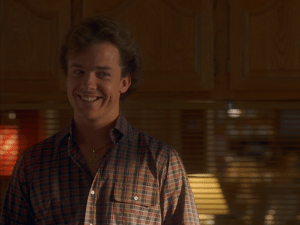
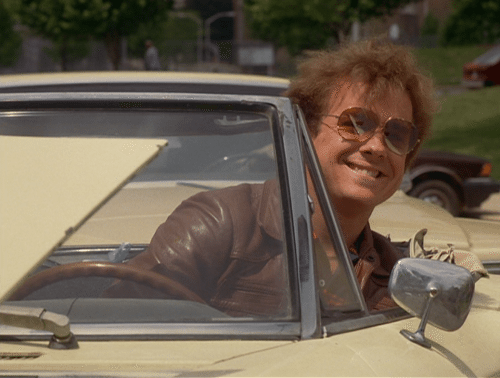
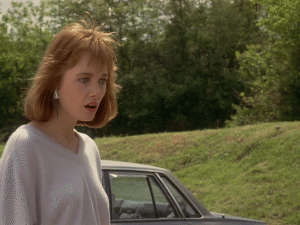
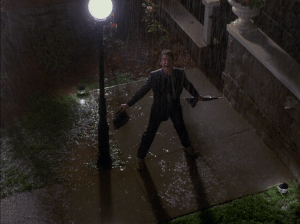
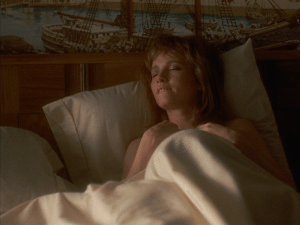
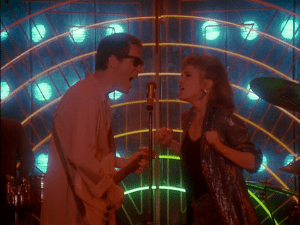
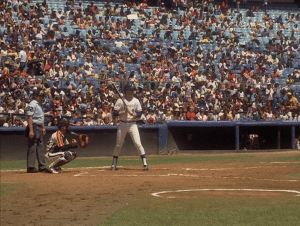
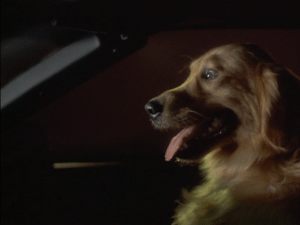
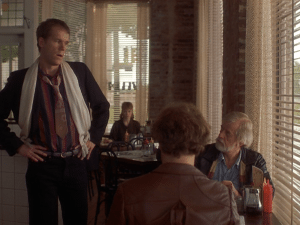
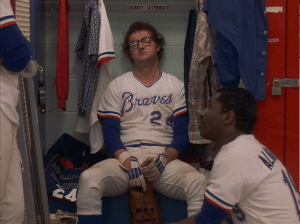
I can’t wait to watch this.
Meanwhile, your devotion to Ashby completism is appreciated.
I just need to track down Second Hand Hearts. Or buy it. It’s not on Netflix.
And I guess watch Lets Spend the Night Together. His TV pilot which actually sounds interesting I’ve yet to track down anywhere. Written by and starring Graham Chapman.
Good news! This is now streaming on Amazon Prime: https://www.amazon.com/gp/product/B07KJNQS5L
So your excuses for not watching it are winnowed down to “it’s terrible.”
And, apropos of this news, I will share that we’ve been in e-discussion with someone with first-hand knowledge of Hal Ashby’s less-good films; as in: she worked on one. So we know now, with more certainty, that he shoulders quite a bit of the blame not only for how (at least one) ended up, but how they started and progressed. If we can gather enough info to be worth sharing further, we will.
The Slugger’s Wife was not the best film which Hal Ashby enjoys directing this because sometimes it was Ray Stark’s fault as producer
for not having given the film this much love
and compassion so he was fired from Sony
in 2000.